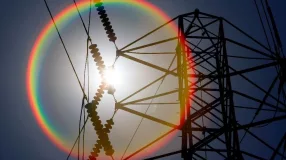The Federal Energy Regulatory Commission (FERC) is one of the most important, talented and productive energy regulatory bodies in the country. FERC is the U.S. federal agency charged with regulating a wide range of energy functions, including the interstate transmission and sale for resale of electricity by electric utilities, the transmission and sale of natural gas for resale in interstate commerce, and the transportation of oil by pipeline in interstate commerce. FERC also reviews proposals to build interstate natural gas pipelines, natural gas storage projects, and liquefied natural gas (LNG) terminals under the Natural Gas Act, in addition to licensing non-federal hydropower projects under the Federal Power Act (FPA).
When Congress established FERC’s predecessor, the Federal Power Commission (FPC) in 1920 under the Federal Water Power Act (FWPA, also referred to today as the FPA), it was a landmark piece of legislation that provided oversight of hydropower projects and electric utilities. Shortly thereafter in 1930 under President Hoover’s administration, the FPC was officially recognized as an independent federal agency comprised of five commissioners, which is how it stands today. In 1938 Congress passed the Natural Gas Act and directed the FPC to regulate transportation and sale of wholesale natural gas in interstate commerce (15 USC § 717(b)).
For the last 90 years, FERC has been governed by five commissioners, who are nominated by the President, confirmed by the U.S. Senate, and bring a diverse set of work and political backgrounds to the Commission. While each Commissioner may take different approaches to issues based on his or her perspective and background, all are charged with the important responsibility of issuing regulatory decisions that comply with the Natural Gas Act and the FPA and are consistent with controlling federal case law.
Today, FERC has only three sitting commissioners. This is the minimum number of commissioners under which FERC can operate effectively—a quorum of three commissioners is needed to issue decisions on behalf of the agency. Without a quorum, FERC is unable to approve the construction of new natural gas pipeline infrastructure found to be in the public convenience and necessity, approve necessary improvements to the basic safety, efficiency and reliability of the pipeline system, or exercise oversight of pipeline or electric utility rate and service changes.
Last year alone, the Commission certificated 36 new pipeline projects, subject to numerous conditions to protect the environment both during and after construction, which included 661 miles of pipeline and 18.1 billion cubic feet per day (Bcfd) of authorized capacity—enough capacity to transport more than 20% of the natural gas used each year in the U.S. FERC also acted on hundreds of gas pipeline rate and tariff filings. These numbers demonstrate the critical role FERC plays in ensuring our nation’s natural gas transportation infrastructure expands in a responsible manner to meet growing customer demand for natural gas and in overseeing the rates and terms and conditions under which gas pipelines operate.
In July, President Trump announced two nominees—one Republican and one Democrat—to fill the two vacant commissioner seats at FERC and to ensure the Commission will continue to enjoy a bipartisan quorum in the coming years. Since then, both candidates have undergone extensive review and vetting by the Senate Energy and Natural Resources (ENR) Committee. Unfortunately, neither nomination has been voted on by the committee or considered by the full Senate. Without the remaining two commissioner seats filled, critical infrastructure projects and oversight will be delayed should just one of the three current commissioners either have to recuse himself from voting on an order or decide to leave FERC. And beyond quorum-related concerns, FERC works best when it can benefit from the diverse perspectives, experience and knowledge of a full complement of five commissioners.
As Senate Energy and Natural Resources Chairman Lisa Murkowski (R-AK) recently said, emphasizing the importance of FERC’s staff and commissioners, “FERC has a lot of work, and we want to make sure that they've got the people, the commissioners that they need to do the work.” With less than 20 days left on the congressional calendar, the Senate should work swiftly to restore the Commission’s full working capacity.
As the agency responsible for certificating interstate natural gas pipelines and establishing the rates and terms and conditions under which they must operate, FERC plays an integral role in the modernization and development of America’s energy infrastructure. Together, the commissioners and their staffs carry out the agency’s important work that allows INGAA members to meet the energy needs of our nation’s homes, businesses, and communities. In part two of this series, we’ll take a deeper look at the history of FERC and the role the commission plays in the certification of natural gas pipelines.







